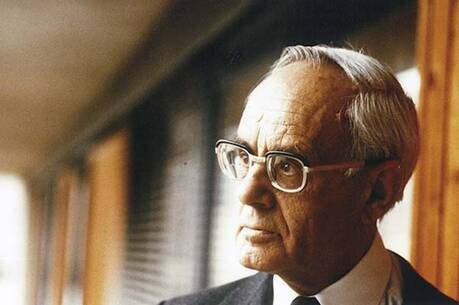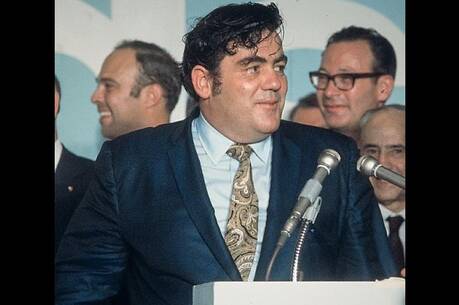Reel Theology
At first the inclusion of Brian De Palma among the six directors thoughtfully dissected in Richard A. Blake’s AfterImage: The Indelible Catholic Imagination of Six American Filmmakers did not seem to fit. The other five—Martin Scorsese, Alfred Hitchcock, John Ford, Frank Capra and Francis Ford Coppola—are so clearly Catholic in their sensibility that De Palma’s presence was jarring.
Though by his own admission De Palma owes a substantial creative debt to Hitchcock, his body of work so far has been shaped more by other filmmakers he admired than any tinge of his own background.
As Blake, America’s astute and articulate film critic for more than 25 years, sees it, however, what allows De Palma to be included in this examination—as opposed to, say, the more overtly Catholic Leo McCarey—is that "being an ex-Catholic, even an angry one, does not automatically free the imagination from its Catholic roots, however distant."
And in that shrewd observation, which comes toward the end of this thorough and usually thoroughly engrossing study, is the heart of Blake’s argument. An artist can leave, or even renounce, the church, but as the Irish saying goes, what is bred in the bone will out. De Palma, though reared nominally Presbyterian, has a deeply Italian and Catholic lineage.
Why, however, is a book such as AfterImage not only welcome but necessary? In part it is because works of serious cultural criticism from a Catholic perspective are extremely rare in the popular arts. But it is also because many Catholics in the United States do not even know how deeply the often tangled vein of our own culture has influenced the mainstream.
Blake’s essential argument is that what makes the imagination of these six men particularly and irrevocably Catholic is the way the characters in their films fit into the rest of the world. They are eminently, sometimes agonizingly, human; at the same time they have a great capacity for redemption and renewal. As disparate as the styles of the individual directors are, there is a strong and clear sense in all of them that it is not so much a matter of seeing the light as recognizing all over again that it has been there all along.
That does not mean a reinforcement of optimism or the guarantee of a happy ending. Rather, what brings so diverse a group together is their shared knowledge that what happens in crisis is not change at all, but renewal, a careful and precise shifting of perspective.
There is no clear-cut resolution in any of them, whether it is Henry Fonda’s Tom Joad in Ford’s adaptation of John Steinbeck’s TheGrapes of Wrath, Tippi Hedren’s Melanie Daniels in Hitchcock’s "The Birds," James Stewart’s George Bailey in Capra’s "It’s a Wonderful Life," Robert DeNiro’s Travis Bickle in Scorsese’s "Taxi Driver," Gene Hackman’s Harry Caul in Coppola’s "The Conversation" or Michael J. Fox’s Sven Eriksson in De Palma’s "Casualties of War." They are realists but not cynics; they may not be "people of faith" in the sense commonly used now, but faith, in the end, is what binds them together.
It is not a formal and external faith. Instead, in these examples given and the many others Blake offers with a carefully selective eye, it is a recognition and acceptance of forces beyond themselves. Usually the characters in these films, if not already part of a community of some sort at the start, end up recognizing that they are. Even as tragic a figure as Travis Bickle has forged certain human connections by the end of the film.
Another thing Blake’s book does that is of enormous and lasting value in the often wildly uneven halls of film scholarship is to open up the definition of a "Catholic" film. For entirely too long, the hallmarks of movies even non-Catholics would recognize as "Catholic" were piety and sentiment.
These two were usually bound so tightly together that they became, for a time, the recognizably Catholic traits for the rest of the culture. Wow, a priest who wears a snappy straw boater (Bing Crosby in "Going My Way")! Gosh, a nun at bat (Ingrid Bergman in "The Bells of St. Mary’s")! Heavens, an illiterate peasant girl who holds her own with church authorities (Jennifer Jones in "The Song of Bernadette")!
Then again, those films, though more overtly Catholic on the surface, are devoid of the depth Blake addresses in such detail. The "Catholic imagination" has always been a force in the arts, high or low, sacred or profane.
Blake not only backs this up with a detailed explanation, in the beginning of the book, of the Catholic cultural psyche; he backs it up again and again as he discusses each director’s work. He even writes, in his chapter on Scorsese, "Even the most resolutely nonreligious critics will profit by developing their own Catholic imagination as they approach the films, much as a classicist will try to develop a Roman mind-set while reading Horace."
What Blake is clearly hoping for with that statement is that readers will climb inside the creative and intellectual processes of these half-dozen artists as fully as he has. In doing that, the depth of what they share is richly apparent. Any film junkie knows Hitchcock and De Palma are connected; the thrill here is in seeing and understanding how the other four fit in too, and just as inextricably.
Despite the rapid assimilation of U.S. Catholics into the mainstream after World War II, Blake knows we still stand apart. Better still, at its best AfterImage does a splendid job of telling us, Catholic or not, why this is so.
Editor’s Note: This title is a Catholic Book Club selection.
This article also appeared in print, under the headline “Reel Theology,” in the April 8, 2000, issue.








